A Literature Review: De-escalation Techniques for Aggression Reduction
VerifiedAdded on 2020/03/23
|14
|3188
|44
Report
AI Summary
This report presents a comprehensive literature review on the efficacy of de-escalating techniques in mental health nursing, focusing on the reduction and management of patient aggression. The executive summary highlights the impact of patient aggression on healthcare settings, emphasizing the role of staff behavior and stigmatizing attitudes. The review encompasses studies from databases like MEDLINE, Cochrane Library, and CINAHL, using specific inclusion and exclusion criteria to identify relevant research. The findings explore various de-escalation techniques, including verbal and non-verbal communication, empathy, and patient engagement. Several studies are critically appraised using the CASP tool, revealing the effectiveness of techniques like social interaction, personal control, and skills training in managing aggressive behavior. The report underscores the importance of staff training, supportive environments, and cognitive interventions in fostering safer and more therapeutic outcomes for patients in mental health settings. The report concludes with an overview of the key findings and their implications for clinical practice.
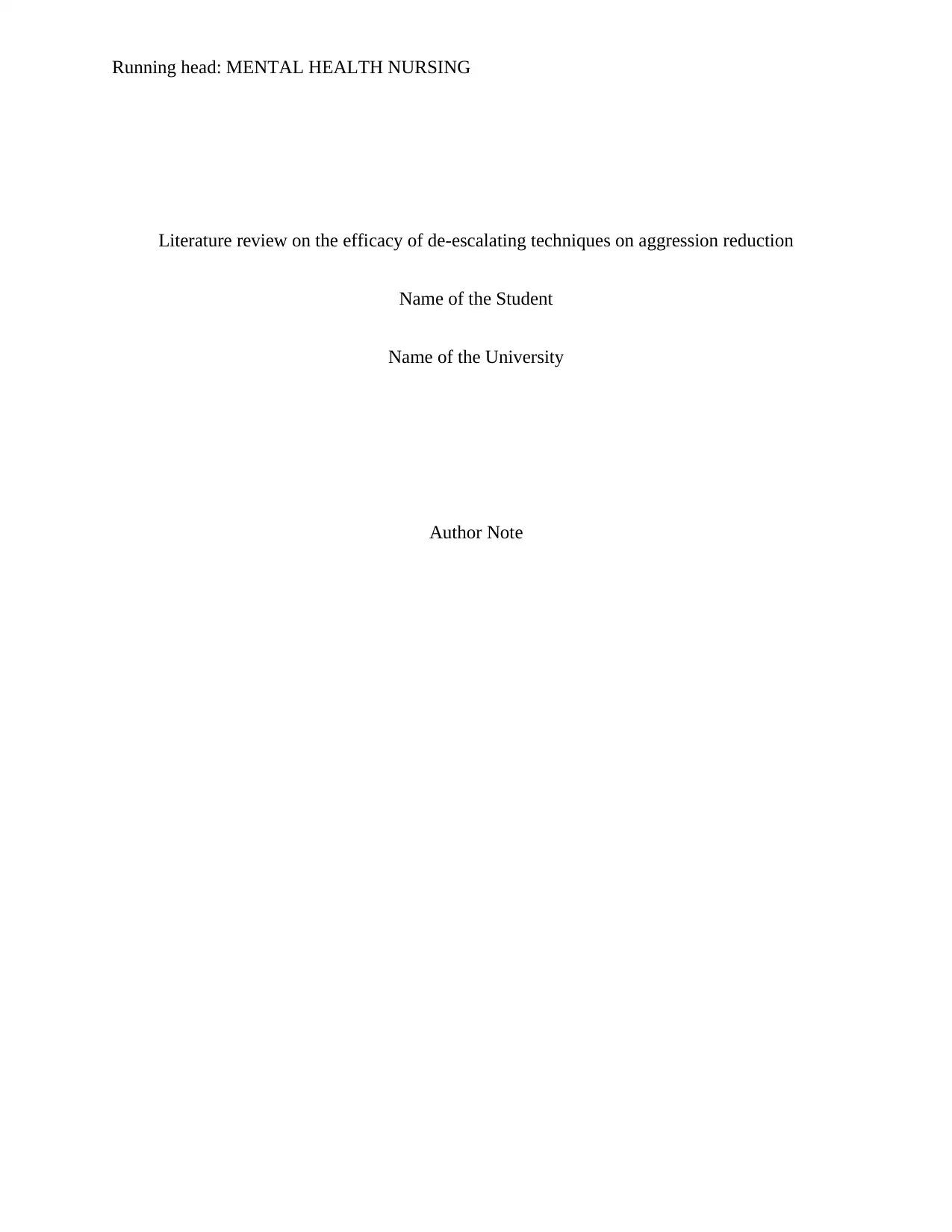
Running head: MENTAL HEALTH NURSING
Literature review on the efficacy of de-escalating techniques on aggression reduction
Name of the Student
Name of the University
Author Note
Literature review on the efficacy of de-escalating techniques on aggression reduction
Name of the Student
Name of the University
Author Note
Paraphrase This Document
Need a fresh take? Get an instant paraphrase of this document with our AI Paraphraser
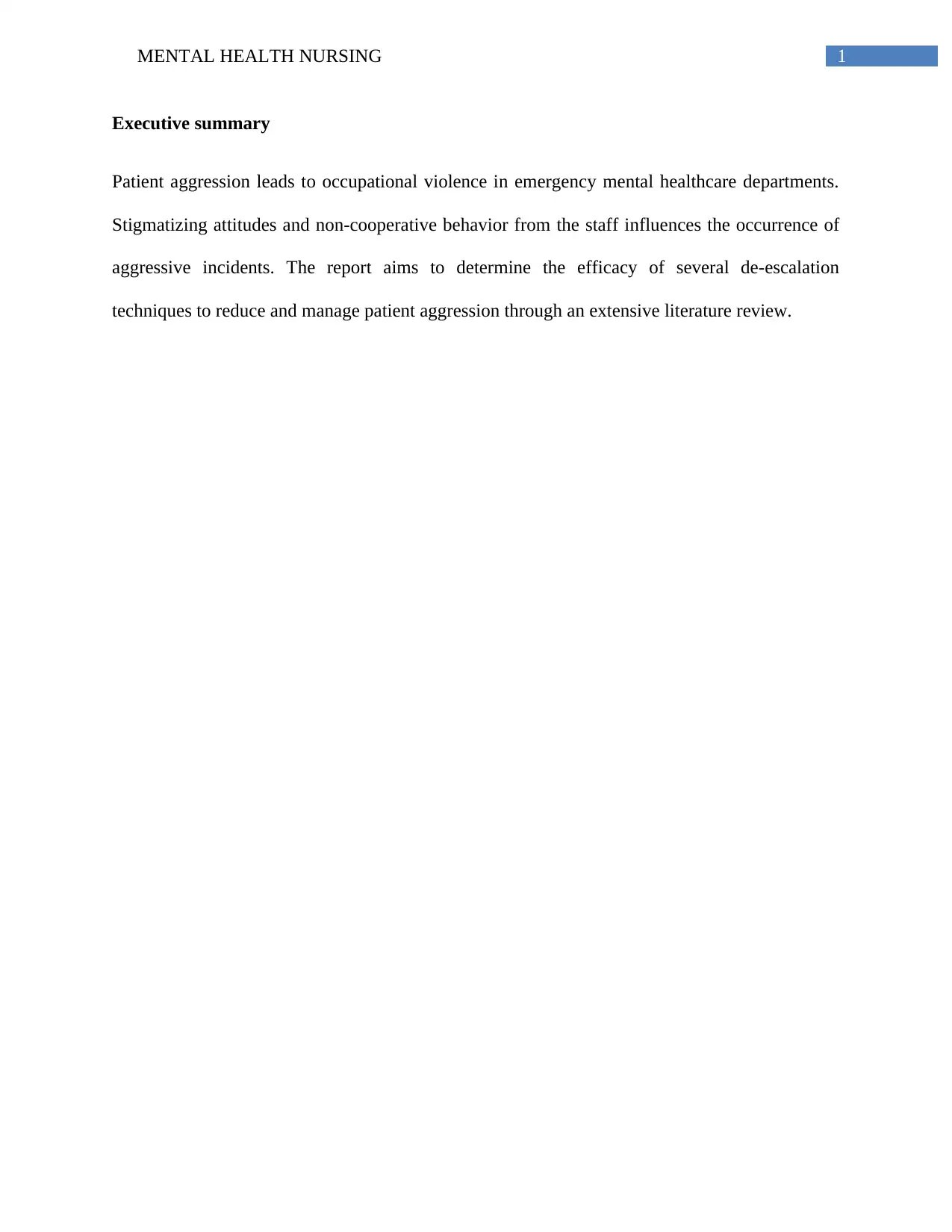
1MENTAL HEALTH NURSING
Executive summary
Patient aggression leads to occupational violence in emergency mental healthcare departments.
Stigmatizing attitudes and non-cooperative behavior from the staff influences the occurrence of
aggressive incidents. The report aims to determine the efficacy of several de-escalation
techniques to reduce and manage patient aggression through an extensive literature review.
Executive summary
Patient aggression leads to occupational violence in emergency mental healthcare departments.
Stigmatizing attitudes and non-cooperative behavior from the staff influences the occurrence of
aggressive incidents. The report aims to determine the efficacy of several de-escalation
techniques to reduce and manage patient aggression through an extensive literature review.
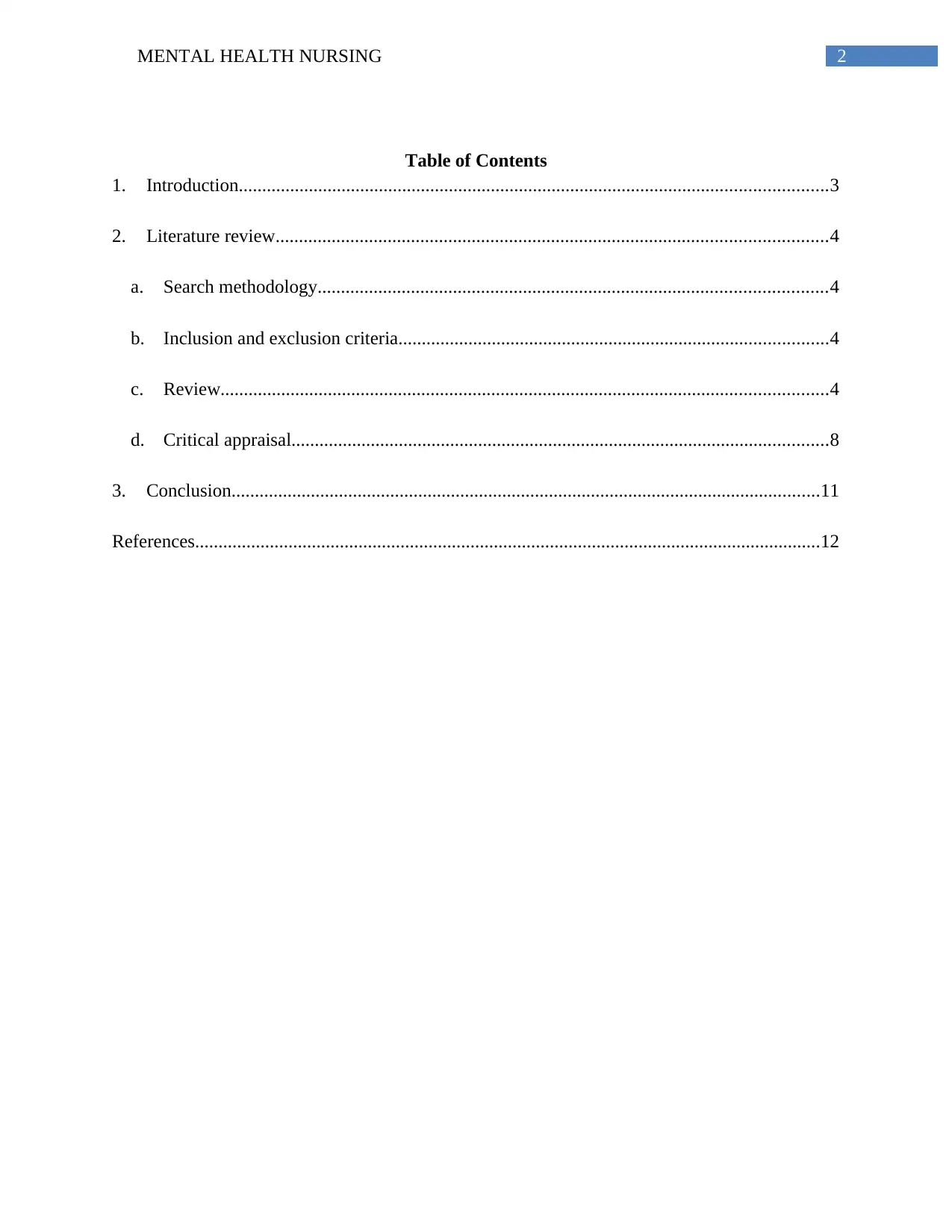
2MENTAL HEALTH NURSING
Table of Contents
1. Introduction..............................................................................................................................3
2. Literature review......................................................................................................................4
a. Search methodology.............................................................................................................4
b. Inclusion and exclusion criteria............................................................................................4
c. Review..................................................................................................................................4
d. Critical appraisal...................................................................................................................8
3. Conclusion..............................................................................................................................11
References......................................................................................................................................12
Table of Contents
1. Introduction..............................................................................................................................3
2. Literature review......................................................................................................................4
a. Search methodology.............................................................................................................4
b. Inclusion and exclusion criteria............................................................................................4
c. Review..................................................................................................................................4
d. Critical appraisal...................................................................................................................8
3. Conclusion..............................................................................................................................11
References......................................................................................................................................12
⊘ This is a preview!⊘
Do you want full access?
Subscribe today to unlock all pages.

Trusted by 1+ million students worldwide
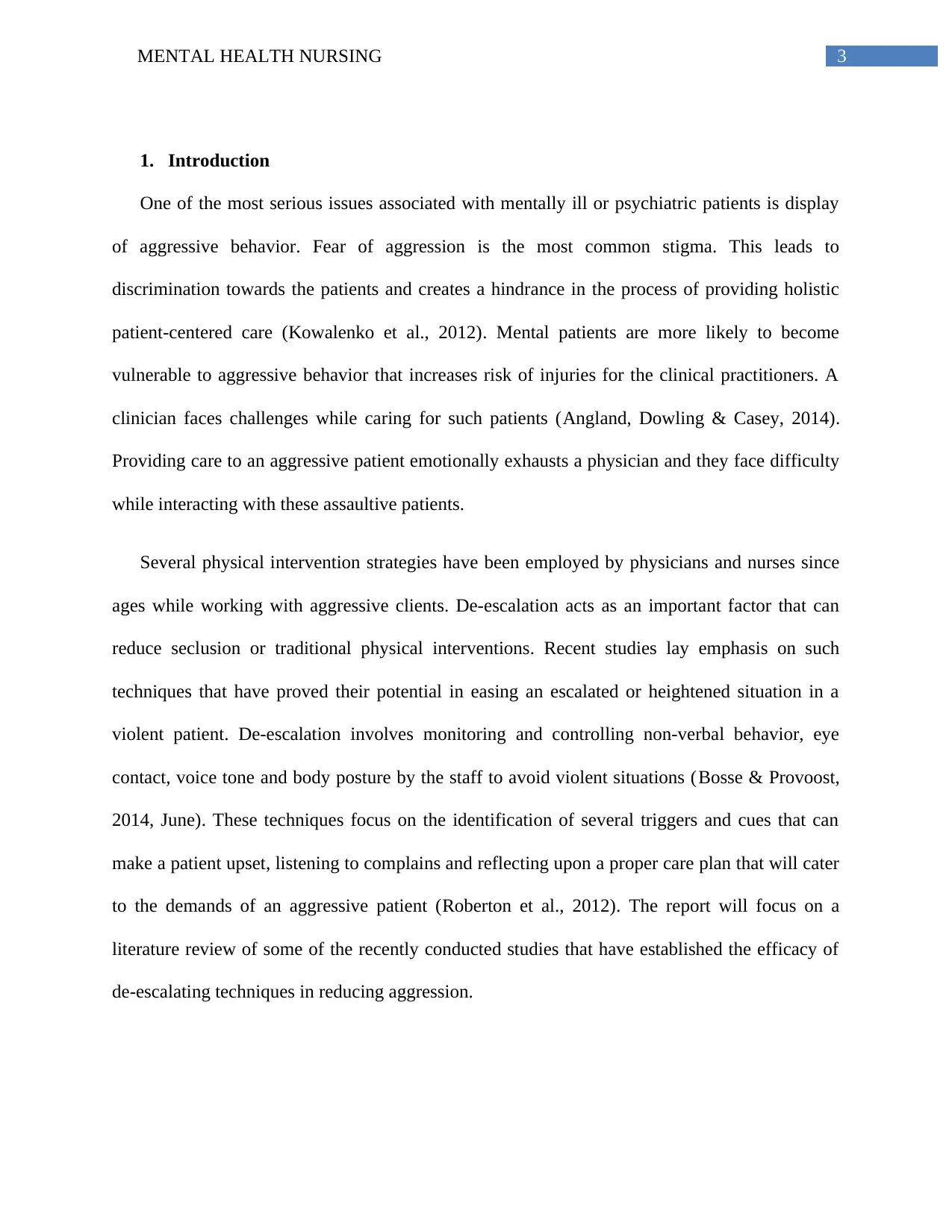
3MENTAL HEALTH NURSING
1. Introduction
One of the most serious issues associated with mentally ill or psychiatric patients is display
of aggressive behavior. Fear of aggression is the most common stigma. This leads to
discrimination towards the patients and creates a hindrance in the process of providing holistic
patient-centered care (Kowalenko et al., 2012). Mental patients are more likely to become
vulnerable to aggressive behavior that increases risk of injuries for the clinical practitioners. A
clinician faces challenges while caring for such patients (Angland, Dowling & Casey, 2014).
Providing care to an aggressive patient emotionally exhausts a physician and they face difficulty
while interacting with these assaultive patients.
Several physical intervention strategies have been employed by physicians and nurses since
ages while working with aggressive clients. De-escalation acts as an important factor that can
reduce seclusion or traditional physical interventions. Recent studies lay emphasis on such
techniques that have proved their potential in easing an escalated or heightened situation in a
violent patient. De-escalation involves monitoring and controlling non-verbal behavior, eye
contact, voice tone and body posture by the staff to avoid violent situations (Bosse & Provoost,
2014, June). These techniques focus on the identification of several triggers and cues that can
make a patient upset, listening to complains and reflecting upon a proper care plan that will cater
to the demands of an aggressive patient (Roberton et al., 2012). The report will focus on a
literature review of some of the recently conducted studies that have established the efficacy of
de-escalating techniques in reducing aggression.
1. Introduction
One of the most serious issues associated with mentally ill or psychiatric patients is display
of aggressive behavior. Fear of aggression is the most common stigma. This leads to
discrimination towards the patients and creates a hindrance in the process of providing holistic
patient-centered care (Kowalenko et al., 2012). Mental patients are more likely to become
vulnerable to aggressive behavior that increases risk of injuries for the clinical practitioners. A
clinician faces challenges while caring for such patients (Angland, Dowling & Casey, 2014).
Providing care to an aggressive patient emotionally exhausts a physician and they face difficulty
while interacting with these assaultive patients.
Several physical intervention strategies have been employed by physicians and nurses since
ages while working with aggressive clients. De-escalation acts as an important factor that can
reduce seclusion or traditional physical interventions. Recent studies lay emphasis on such
techniques that have proved their potential in easing an escalated or heightened situation in a
violent patient. De-escalation involves monitoring and controlling non-verbal behavior, eye
contact, voice tone and body posture by the staff to avoid violent situations (Bosse & Provoost,
2014, June). These techniques focus on the identification of several triggers and cues that can
make a patient upset, listening to complains and reflecting upon a proper care plan that will cater
to the demands of an aggressive patient (Roberton et al., 2012). The report will focus on a
literature review of some of the recently conducted studies that have established the efficacy of
de-escalating techniques in reducing aggression.
Paraphrase This Document
Need a fresh take? Get an instant paraphrase of this document with our AI Paraphraser
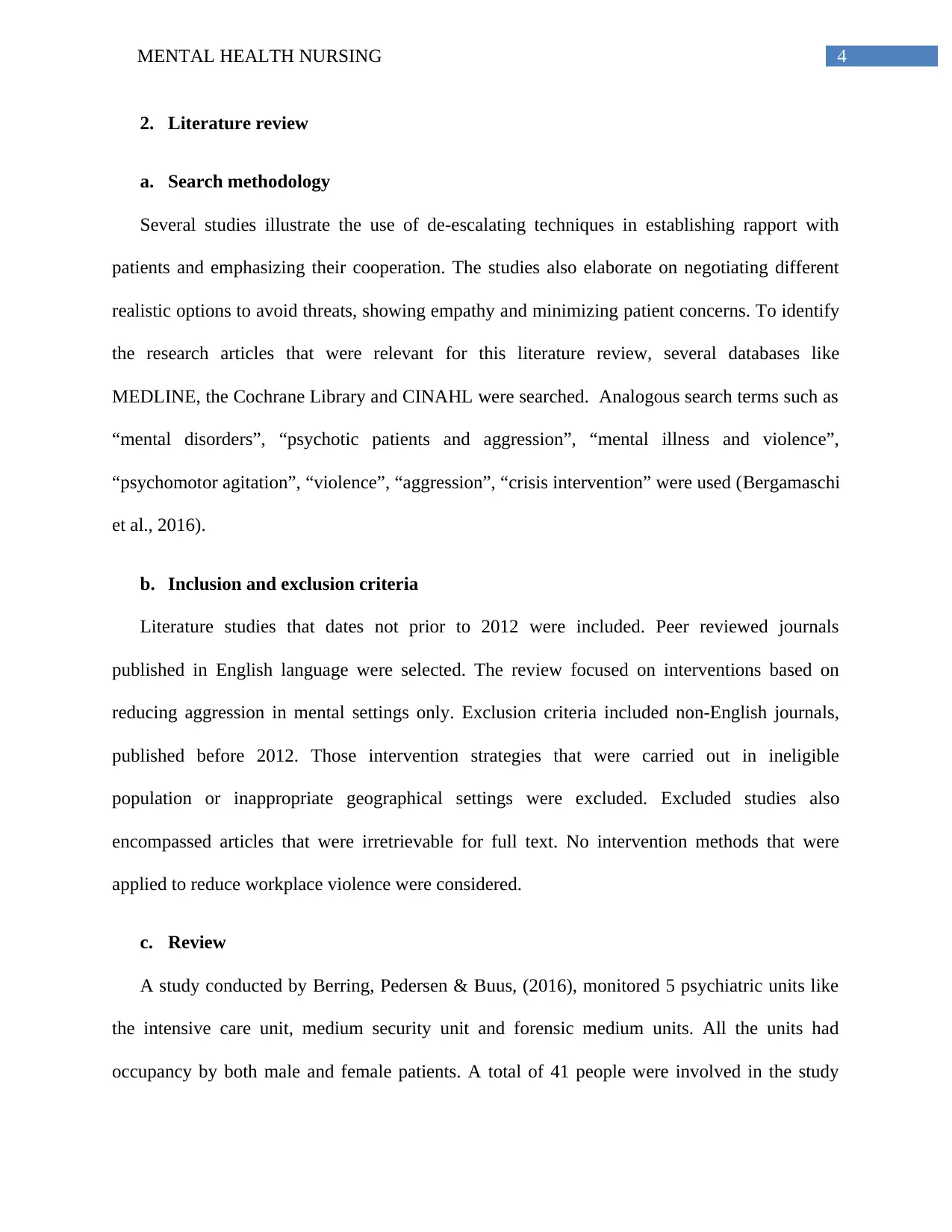
4MENTAL HEALTH NURSING
2. Literature review
a. Search methodology
Several studies illustrate the use of de-escalating techniques in establishing rapport with
patients and emphasizing their cooperation. The studies also elaborate on negotiating different
realistic options to avoid threats, showing empathy and minimizing patient concerns. To identify
the research articles that were relevant for this literature review, several databases like
MEDLINE, the Cochrane Library and CINAHL were searched. Analogous search terms such as
“mental disorders”, “psychotic patients and aggression”, “mental illness and violence”,
“psychomotor agitation”, “violence”, “aggression”, “crisis intervention” were used (Bergamaschi
et al., 2016).
b. Inclusion and exclusion criteria
Literature studies that dates not prior to 2012 were included. Peer reviewed journals
published in English language were selected. The review focused on interventions based on
reducing aggression in mental settings only. Exclusion criteria included non-English journals,
published before 2012. Those intervention strategies that were carried out in ineligible
population or inappropriate geographical settings were excluded. Excluded studies also
encompassed articles that were irretrievable for full text. No intervention methods that were
applied to reduce workplace violence were considered.
c. Review
A study conducted by Berring, Pedersen & Buus, (2016), monitored 5 psychiatric units like
the intensive care unit, medium security unit and forensic medium units. All the units had
occupancy by both male and female patients. A total of 41 people were involved in the study
2. Literature review
a. Search methodology
Several studies illustrate the use of de-escalating techniques in establishing rapport with
patients and emphasizing their cooperation. The studies also elaborate on negotiating different
realistic options to avoid threats, showing empathy and minimizing patient concerns. To identify
the research articles that were relevant for this literature review, several databases like
MEDLINE, the Cochrane Library and CINAHL were searched. Analogous search terms such as
“mental disorders”, “psychotic patients and aggression”, “mental illness and violence”,
“psychomotor agitation”, “violence”, “aggression”, “crisis intervention” were used (Bergamaschi
et al., 2016).
b. Inclusion and exclusion criteria
Literature studies that dates not prior to 2012 were included. Peer reviewed journals
published in English language were selected. The review focused on interventions based on
reducing aggression in mental settings only. Exclusion criteria included non-English journals,
published before 2012. Those intervention strategies that were carried out in ineligible
population or inappropriate geographical settings were excluded. Excluded studies also
encompassed articles that were irretrievable for full text. No intervention methods that were
applied to reduce workplace violence were considered.
c. Review
A study conducted by Berring, Pedersen & Buus, (2016), monitored 5 psychiatric units like
the intensive care unit, medium security unit and forensic medium units. All the units had
occupancy by both male and female patients. A total of 41 people were involved in the study
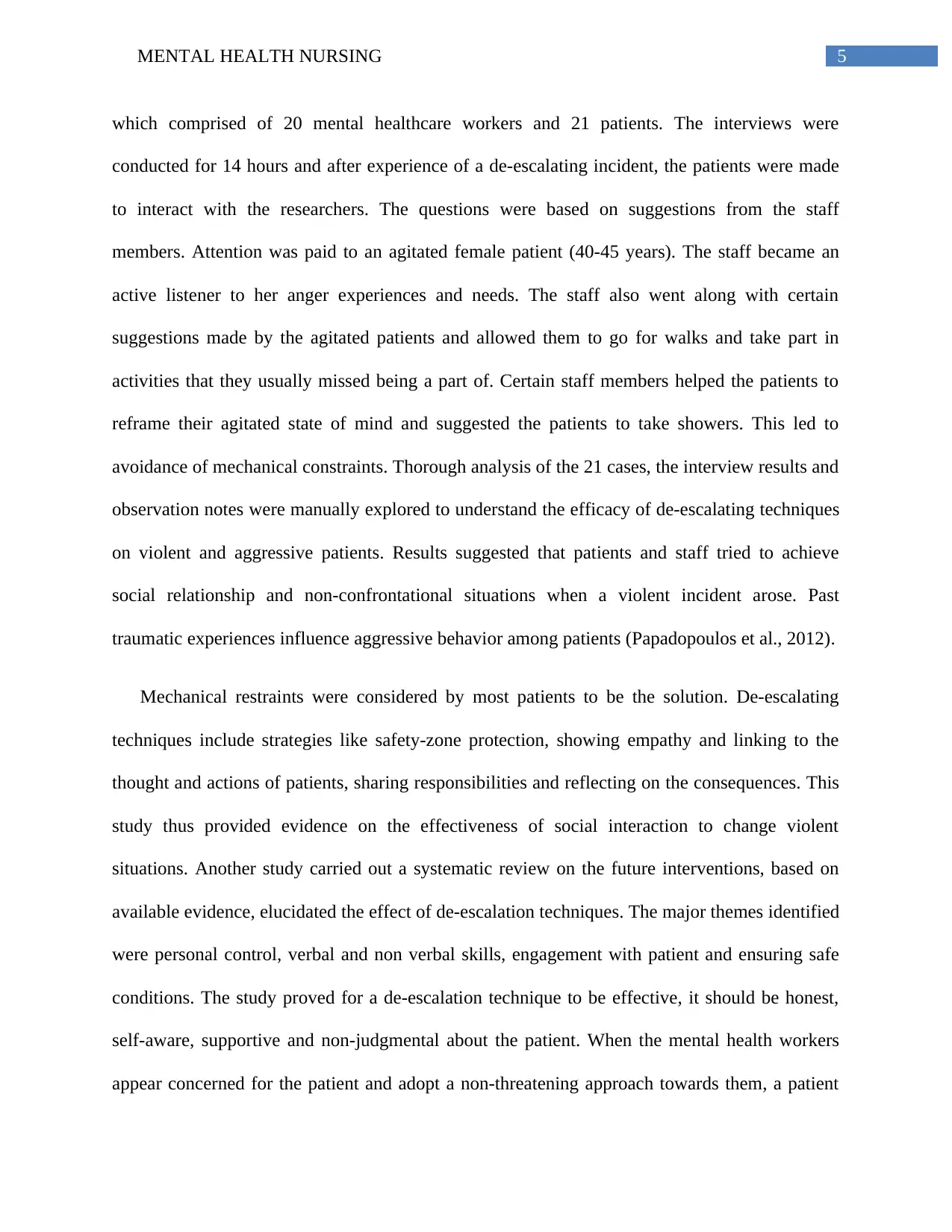
5MENTAL HEALTH NURSING
which comprised of 20 mental healthcare workers and 21 patients. The interviews were
conducted for 14 hours and after experience of a de-escalating incident, the patients were made
to interact with the researchers. The questions were based on suggestions from the staff
members. Attention was paid to an agitated female patient (40-45 years). The staff became an
active listener to her anger experiences and needs. The staff also went along with certain
suggestions made by the agitated patients and allowed them to go for walks and take part in
activities that they usually missed being a part of. Certain staff members helped the patients to
reframe their agitated state of mind and suggested the patients to take showers. This led to
avoidance of mechanical constraints. Thorough analysis of the 21 cases, the interview results and
observation notes were manually explored to understand the efficacy of de-escalating techniques
on violent and aggressive patients. Results suggested that patients and staff tried to achieve
social relationship and non-confrontational situations when a violent incident arose. Past
traumatic experiences influence aggressive behavior among patients (Papadopoulos et al., 2012).
Mechanical restraints were considered by most patients to be the solution. De-escalating
techniques include strategies like safety-zone protection, showing empathy and linking to the
thought and actions of patients, sharing responsibilities and reflecting on the consequences. This
study thus provided evidence on the effectiveness of social interaction to change violent
situations. Another study carried out a systematic review on the future interventions, based on
available evidence, elucidated the effect of de-escalation techniques. The major themes identified
were personal control, verbal and non verbal skills, engagement with patient and ensuring safe
conditions. The study proved for a de-escalation technique to be effective, it should be honest,
self-aware, supportive and non-judgmental about the patient. When the mental health workers
appear concerned for the patient and adopt a non-threatening approach towards them, a patient
which comprised of 20 mental healthcare workers and 21 patients. The interviews were
conducted for 14 hours and after experience of a de-escalating incident, the patients were made
to interact with the researchers. The questions were based on suggestions from the staff
members. Attention was paid to an agitated female patient (40-45 years). The staff became an
active listener to her anger experiences and needs. The staff also went along with certain
suggestions made by the agitated patients and allowed them to go for walks and take part in
activities that they usually missed being a part of. Certain staff members helped the patients to
reframe their agitated state of mind and suggested the patients to take showers. This led to
avoidance of mechanical constraints. Thorough analysis of the 21 cases, the interview results and
observation notes were manually explored to understand the efficacy of de-escalating techniques
on violent and aggressive patients. Results suggested that patients and staff tried to achieve
social relationship and non-confrontational situations when a violent incident arose. Past
traumatic experiences influence aggressive behavior among patients (Papadopoulos et al., 2012).
Mechanical restraints were considered by most patients to be the solution. De-escalating
techniques include strategies like safety-zone protection, showing empathy and linking to the
thought and actions of patients, sharing responsibilities and reflecting on the consequences. This
study thus provided evidence on the effectiveness of social interaction to change violent
situations. Another study carried out a systematic review on the future interventions, based on
available evidence, elucidated the effect of de-escalation techniques. The major themes identified
were personal control, verbal and non verbal skills, engagement with patient and ensuring safe
conditions. The study proved for a de-escalation technique to be effective, it should be honest,
self-aware, supportive and non-judgmental about the patient. When the mental health workers
appear concerned for the patient and adopt a non-threatening approach towards them, a patient
⊘ This is a preview!⊘
Do you want full access?
Subscribe today to unlock all pages.

Trusted by 1+ million students worldwide
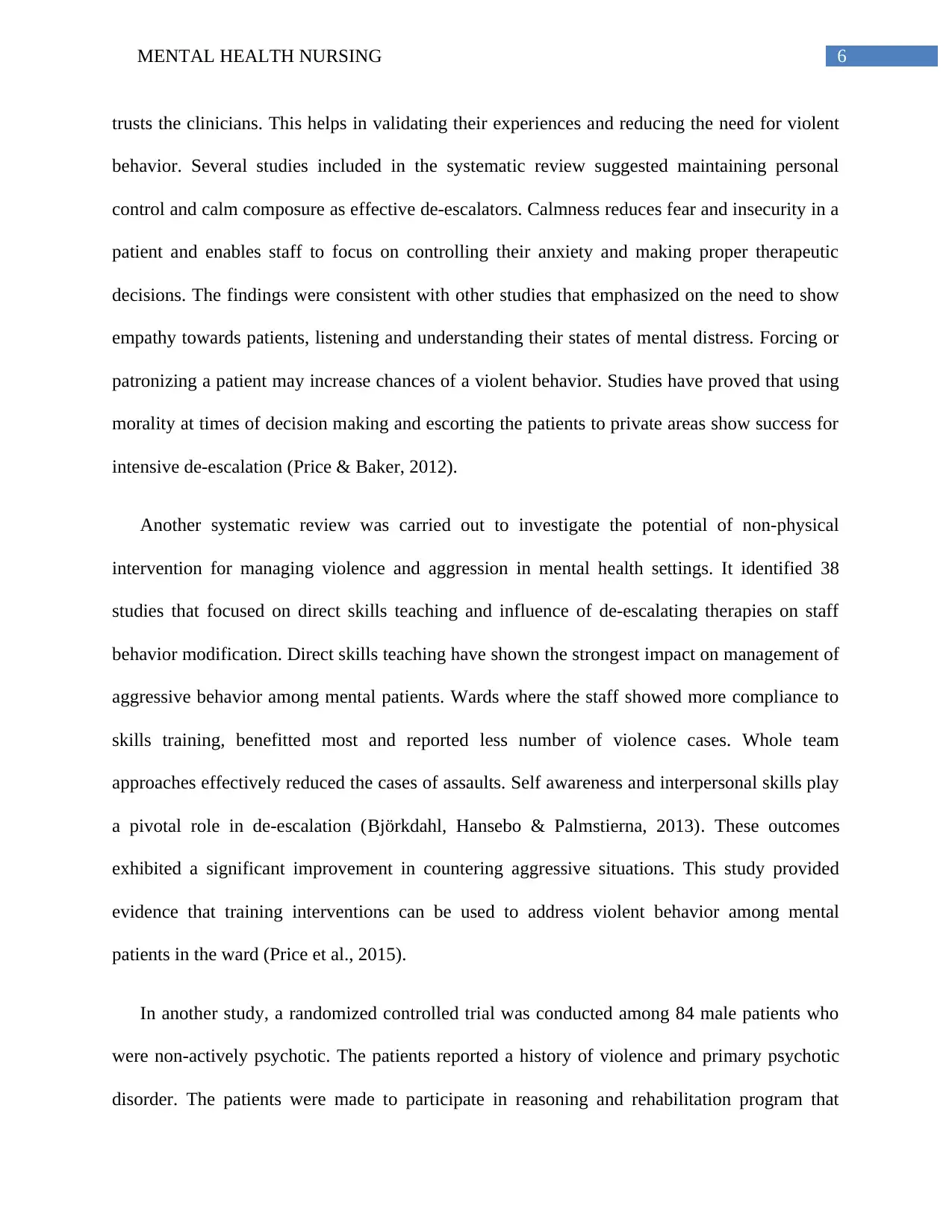
6MENTAL HEALTH NURSING
trusts the clinicians. This helps in validating their experiences and reducing the need for violent
behavior. Several studies included in the systematic review suggested maintaining personal
control and calm composure as effective de-escalators. Calmness reduces fear and insecurity in a
patient and enables staff to focus on controlling their anxiety and making proper therapeutic
decisions. The findings were consistent with other studies that emphasized on the need to show
empathy towards patients, listening and understanding their states of mental distress. Forcing or
patronizing a patient may increase chances of a violent behavior. Studies have proved that using
morality at times of decision making and escorting the patients to private areas show success for
intensive de-escalation (Price & Baker, 2012).
Another systematic review was carried out to investigate the potential of non-physical
intervention for managing violence and aggression in mental health settings. It identified 38
studies that focused on direct skills teaching and influence of de-escalating therapies on staff
behavior modification. Direct skills teaching have shown the strongest impact on management of
aggressive behavior among mental patients. Wards where the staff showed more compliance to
skills training, benefitted most and reported less number of violence cases. Whole team
approaches effectively reduced the cases of assaults. Self awareness and interpersonal skills play
a pivotal role in de-escalation (Björkdahl, Hansebo & Palmstierna, 2013). These outcomes
exhibited a significant improvement in countering aggressive situations. This study provided
evidence that training interventions can be used to address violent behavior among mental
patients in the ward (Price et al., 2015).
In another study, a randomized controlled trial was conducted among 84 male patients who
were non-actively psychotic. The patients reported a history of violence and primary psychotic
disorder. The patients were made to participate in reasoning and rehabilitation program that
trusts the clinicians. This helps in validating their experiences and reducing the need for violent
behavior. Several studies included in the systematic review suggested maintaining personal
control and calm composure as effective de-escalators. Calmness reduces fear and insecurity in a
patient and enables staff to focus on controlling their anxiety and making proper therapeutic
decisions. The findings were consistent with other studies that emphasized on the need to show
empathy towards patients, listening and understanding their states of mental distress. Forcing or
patronizing a patient may increase chances of a violent behavior. Studies have proved that using
morality at times of decision making and escorting the patients to private areas show success for
intensive de-escalation (Price & Baker, 2012).
Another systematic review was carried out to investigate the potential of non-physical
intervention for managing violence and aggression in mental health settings. It identified 38
studies that focused on direct skills teaching and influence of de-escalating therapies on staff
behavior modification. Direct skills teaching have shown the strongest impact on management of
aggressive behavior among mental patients. Wards where the staff showed more compliance to
skills training, benefitted most and reported less number of violence cases. Whole team
approaches effectively reduced the cases of assaults. Self awareness and interpersonal skills play
a pivotal role in de-escalation (Björkdahl, Hansebo & Palmstierna, 2013). These outcomes
exhibited a significant improvement in countering aggressive situations. This study provided
evidence that training interventions can be used to address violent behavior among mental
patients in the ward (Price et al., 2015).
In another study, a randomized controlled trial was conducted among 84 male patients who
were non-actively psychotic. The patients reported a history of violence and primary psychotic
disorder. The patients were made to participate in reasoning and rehabilitation program that
Paraphrase This Document
Need a fresh take? Get an instant paraphrase of this document with our AI Paraphraser
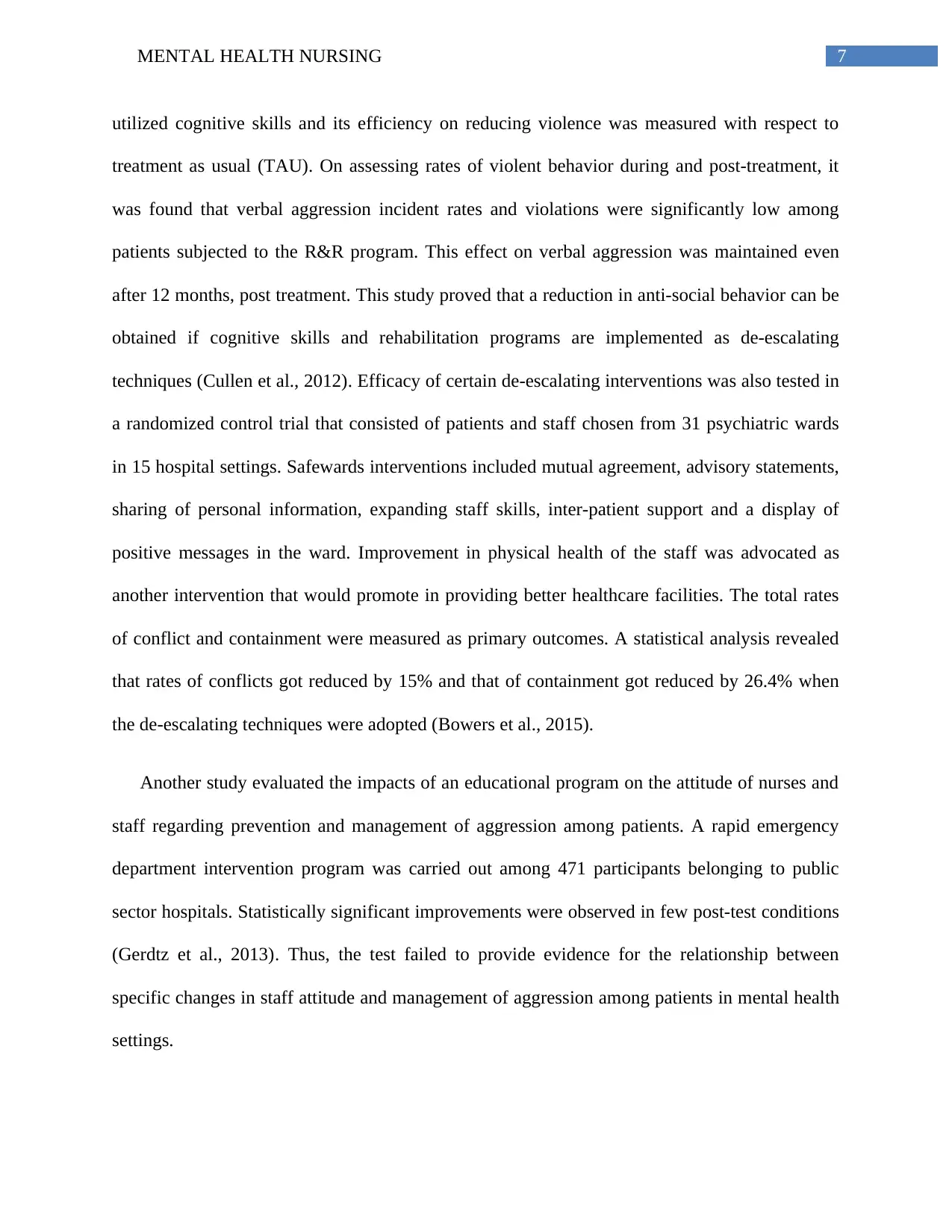
7MENTAL HEALTH NURSING
utilized cognitive skills and its efficiency on reducing violence was measured with respect to
treatment as usual (TAU). On assessing rates of violent behavior during and post-treatment, it
was found that verbal aggression incident rates and violations were significantly low among
patients subjected to the R&R program. This effect on verbal aggression was maintained even
after 12 months, post treatment. This study proved that a reduction in anti-social behavior can be
obtained if cognitive skills and rehabilitation programs are implemented as de-escalating
techniques (Cullen et al., 2012). Efficacy of certain de-escalating interventions was also tested in
a randomized control trial that consisted of patients and staff chosen from 31 psychiatric wards
in 15 hospital settings. Safewards interventions included mutual agreement, advisory statements,
sharing of personal information, expanding staff skills, inter-patient support and a display of
positive messages in the ward. Improvement in physical health of the staff was advocated as
another intervention that would promote in providing better healthcare facilities. The total rates
of conflict and containment were measured as primary outcomes. A statistical analysis revealed
that rates of conflicts got reduced by 15% and that of containment got reduced by 26.4% when
the de-escalating techniques were adopted (Bowers et al., 2015).
Another study evaluated the impacts of an educational program on the attitude of nurses and
staff regarding prevention and management of aggression among patients. A rapid emergency
department intervention program was carried out among 471 participants belonging to public
sector hospitals. Statistically significant improvements were observed in few post-test conditions
(Gerdtz et al., 2013). Thus, the test failed to provide evidence for the relationship between
specific changes in staff attitude and management of aggression among patients in mental health
settings.
utilized cognitive skills and its efficiency on reducing violence was measured with respect to
treatment as usual (TAU). On assessing rates of violent behavior during and post-treatment, it
was found that verbal aggression incident rates and violations were significantly low among
patients subjected to the R&R program. This effect on verbal aggression was maintained even
after 12 months, post treatment. This study proved that a reduction in anti-social behavior can be
obtained if cognitive skills and rehabilitation programs are implemented as de-escalating
techniques (Cullen et al., 2012). Efficacy of certain de-escalating interventions was also tested in
a randomized control trial that consisted of patients and staff chosen from 31 psychiatric wards
in 15 hospital settings. Safewards interventions included mutual agreement, advisory statements,
sharing of personal information, expanding staff skills, inter-patient support and a display of
positive messages in the ward. Improvement in physical health of the staff was advocated as
another intervention that would promote in providing better healthcare facilities. The total rates
of conflict and containment were measured as primary outcomes. A statistical analysis revealed
that rates of conflicts got reduced by 15% and that of containment got reduced by 26.4% when
the de-escalating techniques were adopted (Bowers et al., 2015).
Another study evaluated the impacts of an educational program on the attitude of nurses and
staff regarding prevention and management of aggression among patients. A rapid emergency
department intervention program was carried out among 471 participants belonging to public
sector hospitals. Statistically significant improvements were observed in few post-test conditions
(Gerdtz et al., 2013). Thus, the test failed to provide evidence for the relationship between
specific changes in staff attitude and management of aggression among patients in mental health
settings.
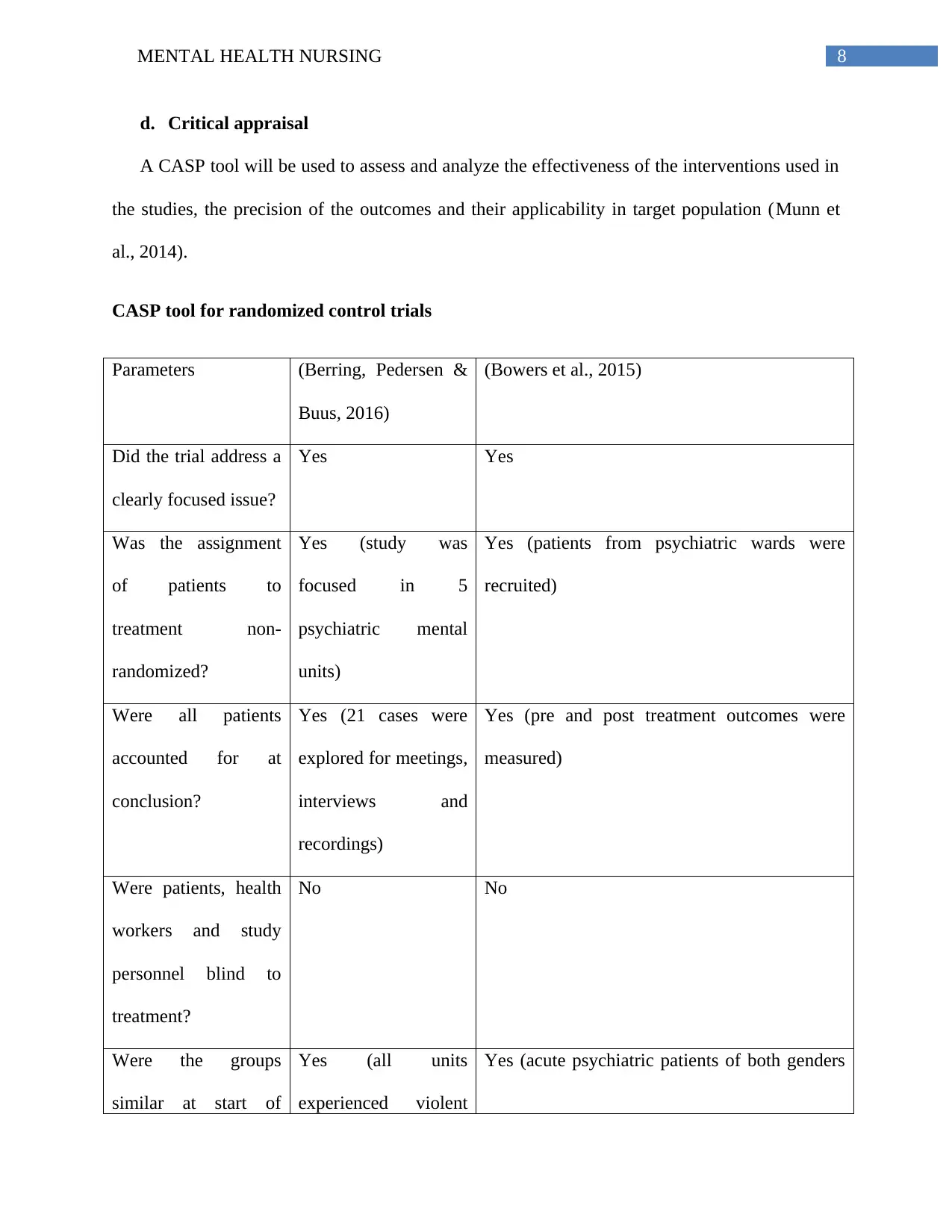
8MENTAL HEALTH NURSING
d. Critical appraisal
A CASP tool will be used to assess and analyze the effectiveness of the interventions used in
the studies, the precision of the outcomes and their applicability in target population (Munn et
al., 2014).
CASP tool for randomized control trials
Parameters (Berring, Pedersen &
Buus, 2016)
(Bowers et al., 2015)
Did the trial address a
clearly focused issue?
Yes Yes
Was the assignment
of patients to
treatment non-
randomized?
Yes (study was
focused in 5
psychiatric mental
units)
Yes (patients from psychiatric wards were
recruited)
Were all patients
accounted for at
conclusion?
Yes (21 cases were
explored for meetings,
interviews and
recordings)
Yes (pre and post treatment outcomes were
measured)
Were patients, health
workers and study
personnel blind to
treatment?
No No
Were the groups
similar at start of
Yes (all units
experienced violent
Yes (acute psychiatric patients of both genders
d. Critical appraisal
A CASP tool will be used to assess and analyze the effectiveness of the interventions used in
the studies, the precision of the outcomes and their applicability in target population (Munn et
al., 2014).
CASP tool for randomized control trials
Parameters (Berring, Pedersen &
Buus, 2016)
(Bowers et al., 2015)
Did the trial address a
clearly focused issue?
Yes Yes
Was the assignment
of patients to
treatment non-
randomized?
Yes (study was
focused in 5
psychiatric mental
units)
Yes (patients from psychiatric wards were
recruited)
Were all patients
accounted for at
conclusion?
Yes (21 cases were
explored for meetings,
interviews and
recordings)
Yes (pre and post treatment outcomes were
measured)
Were patients, health
workers and study
personnel blind to
treatment?
No No
Were the groups
similar at start of
Yes (all units
experienced violent
Yes (acute psychiatric patients of both genders
⊘ This is a preview!⊘
Do you want full access?
Subscribe today to unlock all pages.

Trusted by 1+ million students worldwide
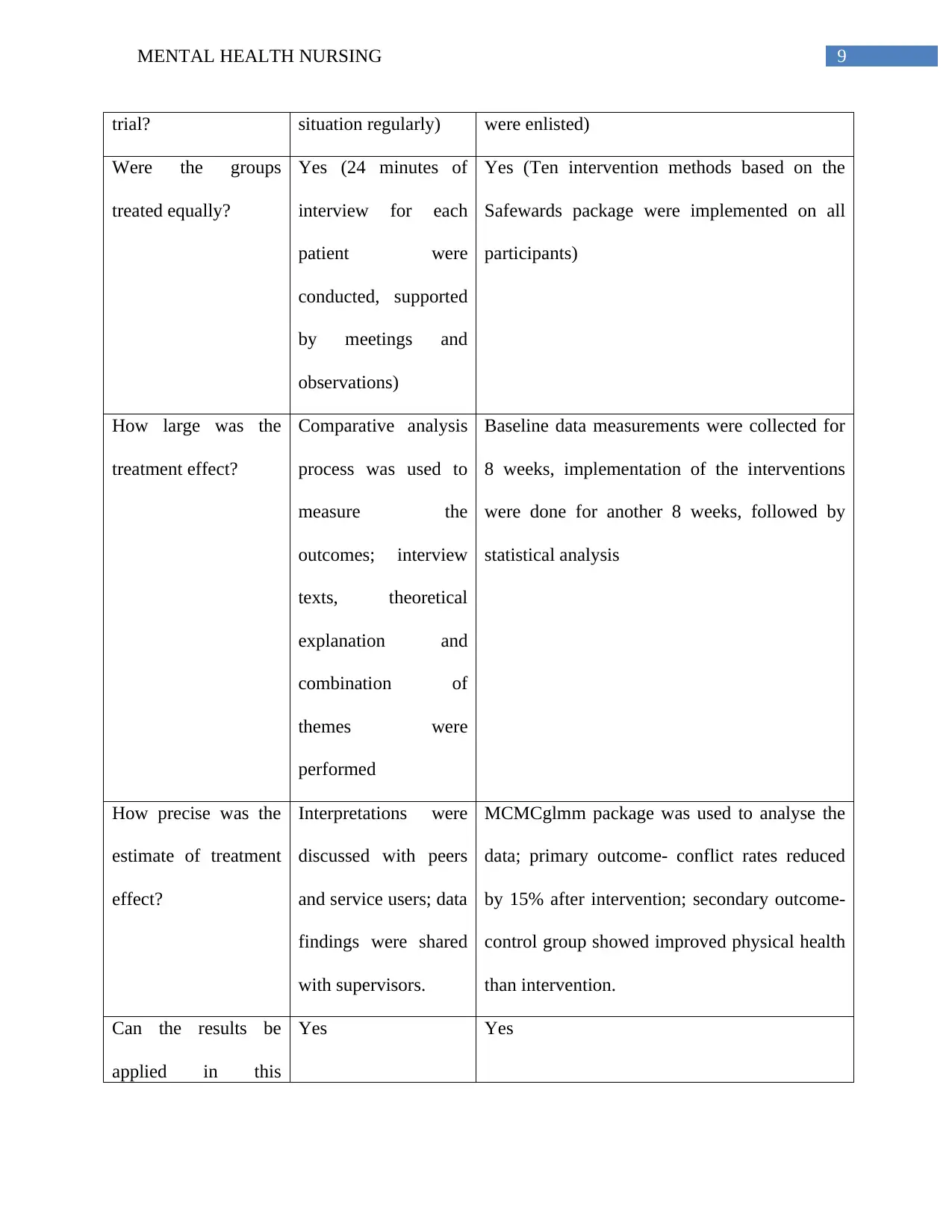
9MENTAL HEALTH NURSING
trial? situation regularly) were enlisted)
Were the groups
treated equally?
Yes (24 minutes of
interview for each
patient were
conducted, supported
by meetings and
observations)
Yes (Ten intervention methods based on the
Safewards package were implemented on all
participants)
How large was the
treatment effect?
Comparative analysis
process was used to
measure the
outcomes; interview
texts, theoretical
explanation and
combination of
themes were
performed
Baseline data measurements were collected for
8 weeks, implementation of the interventions
were done for another 8 weeks, followed by
statistical analysis
How precise was the
estimate of treatment
effect?
Interpretations were
discussed with peers
and service users; data
findings were shared
with supervisors.
MCMCglmm package was used to analyse the
data; primary outcome- conflict rates reduced
by 15% after intervention; secondary outcome-
control group showed improved physical health
than intervention.
Can the results be
applied in this
Yes Yes
trial? situation regularly) were enlisted)
Were the groups
treated equally?
Yes (24 minutes of
interview for each
patient were
conducted, supported
by meetings and
observations)
Yes (Ten intervention methods based on the
Safewards package were implemented on all
participants)
How large was the
treatment effect?
Comparative analysis
process was used to
measure the
outcomes; interview
texts, theoretical
explanation and
combination of
themes were
performed
Baseline data measurements were collected for
8 weeks, implementation of the interventions
were done for another 8 weeks, followed by
statistical analysis
How precise was the
estimate of treatment
effect?
Interpretations were
discussed with peers
and service users; data
findings were shared
with supervisors.
MCMCglmm package was used to analyse the
data; primary outcome- conflict rates reduced
by 15% after intervention; secondary outcome-
control group showed improved physical health
than intervention.
Can the results be
applied in this
Yes Yes
Paraphrase This Document
Need a fresh take? Get an instant paraphrase of this document with our AI Paraphraser
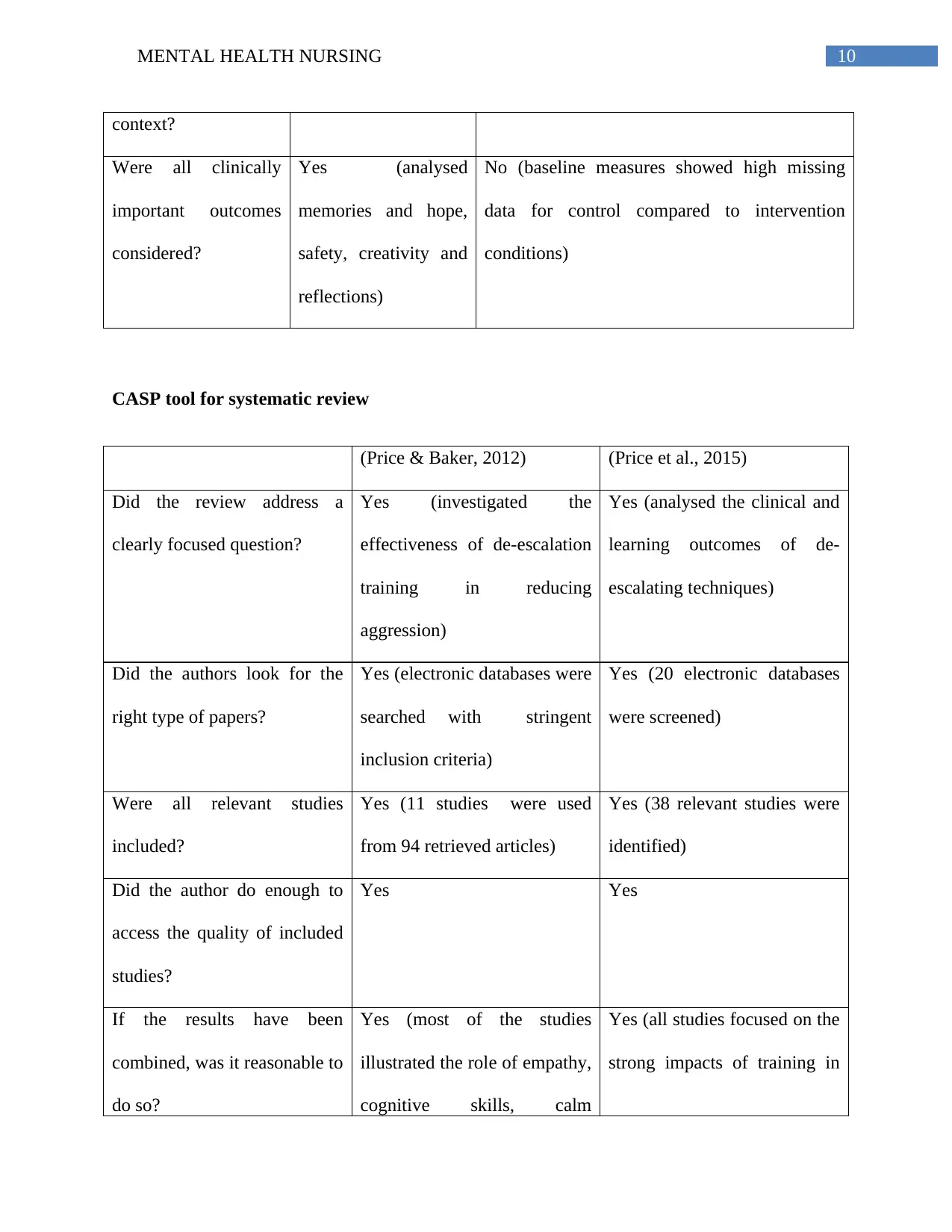
10MENTAL HEALTH NURSING
context?
Were all clinically
important outcomes
considered?
Yes (analysed
memories and hope,
safety, creativity and
reflections)
No (baseline measures showed high missing
data for control compared to intervention
conditions)
CASP tool for systematic review
(Price & Baker, 2012) (Price et al., 2015)
Did the review address a
clearly focused question?
Yes (investigated the
effectiveness of de-escalation
training in reducing
aggression)
Yes (analysed the clinical and
learning outcomes of de-
escalating techniques)
Did the authors look for the
right type of papers?
Yes (electronic databases were
searched with stringent
inclusion criteria)
Yes (20 electronic databases
were screened)
Were all relevant studies
included?
Yes (11 studies were used
from 94 retrieved articles)
Yes (38 relevant studies were
identified)
Did the author do enough to
access the quality of included
studies?
Yes Yes
If the results have been
combined, was it reasonable to
do so?
Yes (most of the studies
illustrated the role of empathy,
cognitive skills, calm
Yes (all studies focused on the
strong impacts of training in
context?
Were all clinically
important outcomes
considered?
Yes (analysed
memories and hope,
safety, creativity and
reflections)
No (baseline measures showed high missing
data for control compared to intervention
conditions)
CASP tool for systematic review
(Price & Baker, 2012) (Price et al., 2015)
Did the review address a
clearly focused question?
Yes (investigated the
effectiveness of de-escalation
training in reducing
aggression)
Yes (analysed the clinical and
learning outcomes of de-
escalating techniques)
Did the authors look for the
right type of papers?
Yes (electronic databases were
searched with stringent
inclusion criteria)
Yes (20 electronic databases
were screened)
Were all relevant studies
included?
Yes (11 studies were used
from 94 retrieved articles)
Yes (38 relevant studies were
identified)
Did the author do enough to
access the quality of included
studies?
Yes Yes
If the results have been
combined, was it reasonable to
do so?
Yes (most of the studies
illustrated the role of empathy,
cognitive skills, calm
Yes (all studies focused on the
strong impacts of training in
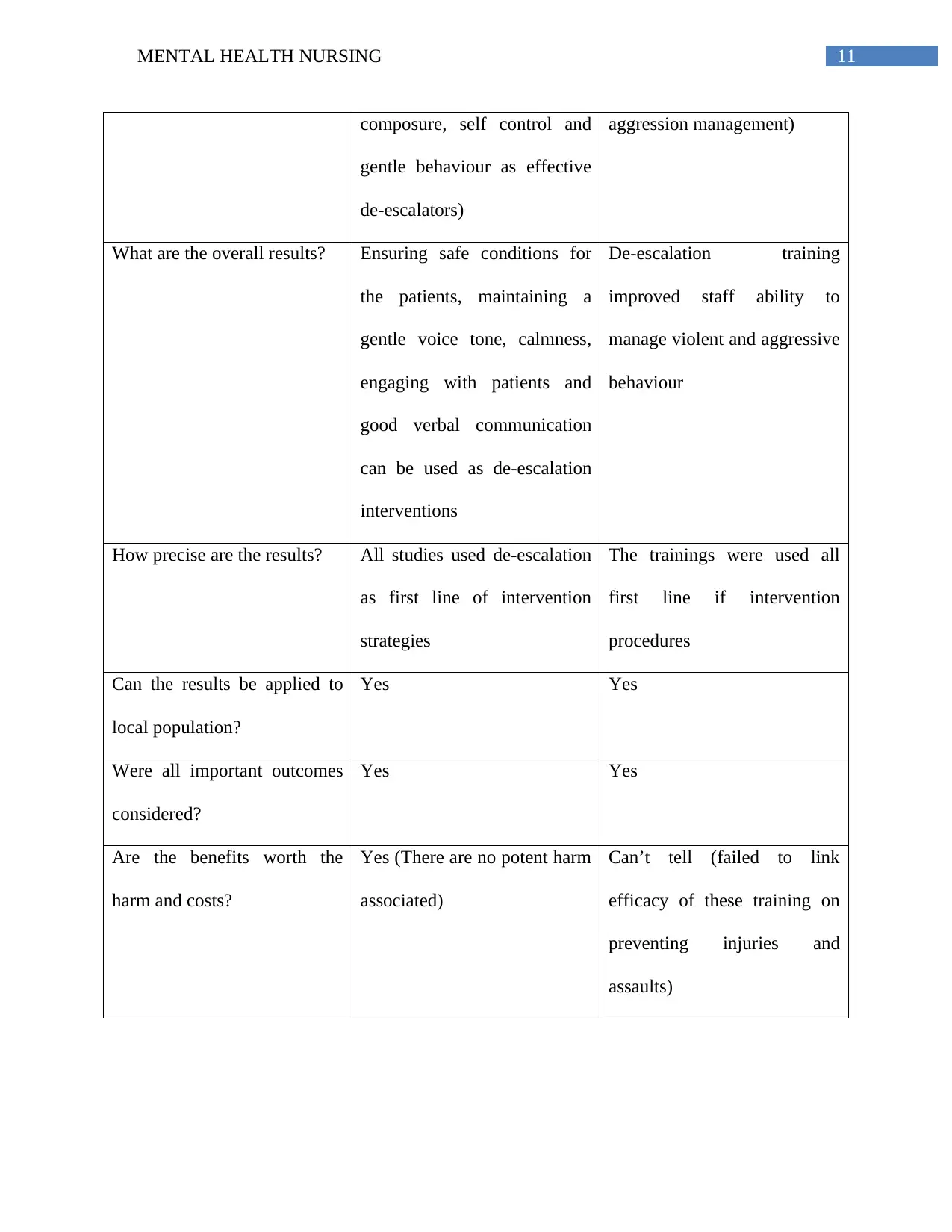
11MENTAL HEALTH NURSING
composure, self control and
gentle behaviour as effective
de-escalators)
aggression management)
What are the overall results? Ensuring safe conditions for
the patients, maintaining a
gentle voice tone, calmness,
engaging with patients and
good verbal communication
can be used as de-escalation
interventions
De-escalation training
improved staff ability to
manage violent and aggressive
behaviour
How precise are the results? All studies used de-escalation
as first line of intervention
strategies
The trainings were used all
first line if intervention
procedures
Can the results be applied to
local population?
Yes Yes
Were all important outcomes
considered?
Yes Yes
Are the benefits worth the
harm and costs?
Yes (There are no potent harm
associated)
Can’t tell (failed to link
efficacy of these training on
preventing injuries and
assaults)
composure, self control and
gentle behaviour as effective
de-escalators)
aggression management)
What are the overall results? Ensuring safe conditions for
the patients, maintaining a
gentle voice tone, calmness,
engaging with patients and
good verbal communication
can be used as de-escalation
interventions
De-escalation training
improved staff ability to
manage violent and aggressive
behaviour
How precise are the results? All studies used de-escalation
as first line of intervention
strategies
The trainings were used all
first line if intervention
procedures
Can the results be applied to
local population?
Yes Yes
Were all important outcomes
considered?
Yes Yes
Are the benefits worth the
harm and costs?
Yes (There are no potent harm
associated)
Can’t tell (failed to link
efficacy of these training on
preventing injuries and
assaults)
⊘ This is a preview!⊘
Do you want full access?
Subscribe today to unlock all pages.

Trusted by 1+ million students worldwide
1 out of 14
Related Documents
Your All-in-One AI-Powered Toolkit for Academic Success.
+13062052269
info@desklib.com
Available 24*7 on WhatsApp / Email
![[object Object]](/_next/static/media/star-bottom.7253800d.svg)
Unlock your academic potential
Copyright © 2020–2026 A2Z Services. All Rights Reserved. Developed and managed by ZUCOL.




